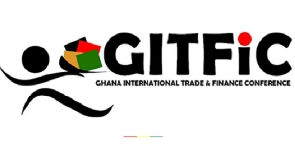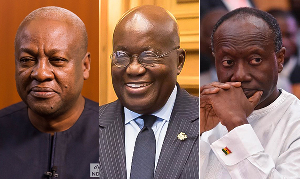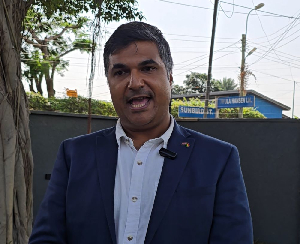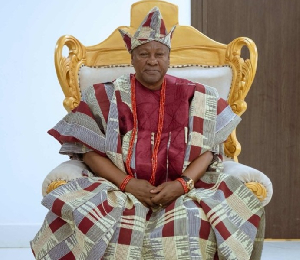Preamble
The consensus by the African Heads of State and Government, in 2018, translated into the establishment of the African Continental Free Trade Area (AfCFTA) as a single market for trade in goods and services. The operationalization of the AfCFTA deepens economic integration for African economies and manifest the will of its about 1.3 billion people to trade seamlessly with minimal barriers. The use of a single African currency as medium of exchange therefore becomes a veritable milestone that must be attained.
Conference overview
The Ghana International Trade and Finance Conference (GITFiC) organized its 7th Trade and Finance Conference at the Royal Senchi Hotel & Resort, Eastern Region – Ghana, to particularly provide a platform for seasoned experts in trade and finance to share perspectives and deepen the discussion on the importance of a Single Currency for Africa. Other related themes on promotion of Micro, Small, Medium Enterprises (MSMEs) as well as Dispute Resolution were discussed by participants.
The Conference held between the May 26 through to May 27, 2023, saw the participation of several dignitaries and key stakeholders from industry, academia, and the trade & finance ecosystem. The Conference was chaired by Ing. Ken Arthur, the Deputy Chief Executive Officer (Services) of the Volta River Authority (VRA).
In special attendance was the Paramount Chief of the Akwamuman, Odeneho Kwafo Akoto III, who underscored the need for traditional authorities to be actively involved in formulating policies and strategies towards the realization of the objectives of the AfCFTA.
Dignitaries including the Eastern Regional Minister, Seth Acheampong, and the Deputy Minister for Foreign Affairs and Regional Integration, Thomas Mboba, presented an overview of measures adopted by government of Ghana to ensure that the benefits of the AfCFTA are fully harnessed and impactful.
Delegations were also received from the West African Monetary Institute (WAMI), ECOWAS, AU (an Imm. Past Acting Director for Economic Development, Trade and Integration Directorate and Head of Economic Policy, Research and Sustainable Development Division), Cote d’Ivoire and Namibia.
Also in attendance were Representatives from the Volta River Authority (VRA), Ghana Free Zones Authority (GFZA), Ghana International Trade Commission (GITC), Attorney General’s Department, PURC, Ministry of Energy, GCMC, CPC, GHA, FDA, BOST, AGI, MEDIA and key private institutions in trade, business, finance and logistics.
Fraternal, goodwill message was received from the GFZA in a speech read on behalf of its Chief Executive Officer, Amb. Mike Ocquaye Jnr by the Director of Business Development, Lawrence Osei Boateng ESQ. The GFZA highlighted its contribution to the export-led industrial growth and investment attractiveness of Ghana. The Accra Regional Chairman of the Association of Ghana Industries, Tsonam Cleanse Akpeloo, commended the organisers of the Conference fore bringing to fore the importance of a single currency for trading, particularly in the advent of a common trading market under AfCFTA.
The Chief Executive Officer (CEO) of the Ghana International Trade & Finance Conference - GITFIC, Selasi Koffi Ackom, mentioned some of the strides made by the GITFiC in promoting the ideals of the AfCFTA since 2019, where the 3rd Conference was held at the African Union Headquarters in collaboration with the Addis Ababa Chamber of Commerce.
He reiterated the commitment of his institution to provide the forum for policymakers, duty bearers, to deliberate and proffer implementable solutions to the myriad of challenges confronting the trade and finance across the African continent.
Day One of the Conference saw presentations on the theme: “Assessing the perspectives of ECOWAS & African Union on the importance of a Single Currency for Africa”. In addition, for participants to have deeper insights into the presentations, the issues delivered were framed for deliberations in a Panel Session. An immediate Past Director for Economic Development Trade and Integration at the AU, Dr. Dossina Yeo, shared perspectives on the underlying plans and modalities adopted by the AU towards the implementation of an African Central Bank and a Single African Currency.
The Director of Multilateral Surveillance and Trade Department (MSTD) of the West African Monetary Institute, Mr. John Kotoku, who represented the Director General, pointed to the achievements chalked so far by the WAMI in pursuing the ECO as a common currency for ECOWAS Members. It was stressed that implementation deadline was postponed several times because ECOWAS Member States were unable to meet the full convergence criteria required.
The final day of the conference hosted two panel sessions on the promotion of MSMEs and the Protocol on Dispute Settlement Mechanism (DSM). Dr. Kenji Ajoku (ECOWAS – Imm. Past Head of Industry Directorate) gave an insight into the objectives of the West Africa Industrial Policy (WACIP) formulated by ECOWAS since 2010.
The WACIP intends to increase manufacturing industry contribution to regional GDP from an average of about 7% to over 20% by 2030. A submission shared by a Chief Negotiator of Namibia for the AfCFTA, Mr. Asser Nashikaku, gave participants an overview of steps taken by the Namibian Government to promote MSMEs.
A principal Attorney, Vivian Opoku-Agyakwa ESQ and Mr. Lawrence Osei Boateng ESQ of the GFZA were the lead discussants on the progress of the DSM as a measure to resolve disputes which may arise in the course of international trade. Proceedings of the conference were broadcasted via traditional and social media outlets, while Messrs. Prince Moses Ofori -Atta, General Manager of Asaase Radio and Kwaku Adoboli, a financial stock trader and analyst, served as moderators.
Consensus:
The conference served as a fertile ground for intellectual discussions as conference speakers and panelists made various remarkable contributions towards optimization of the AfCFTA implementation. The following were highlighted:
Noted the importance of economic integration under AfCFTA to prosperity and development, and applauded the commitment shown by Member States evidenced by the high number of ratifications.
Recalled the AU’s adoption of the Treaty establishing the African Economic Community in 1991, wherein the provisions contained in the Treaty called for the establishment of an African Monetary Union for integration of regional monetary zones, and the adoption of an African single currency.
Recognized that the AEC outlined six key milestones which included the operationalization of a single African currency by 2027.
Agreed that a single currency for Africa would bring reduction in trade transaction costs and offset exchange rate volatility and financial market imbalances, as well as enhance mobility of factors of production.
Acknowledged that the geo-political structure of Africa with ties to past colonial cousins was a threat to efforts towards adoption of a single African currency.
6.Recognized that the key indices for a macro-economic convergence required for an African single currency include; inflation (less than 10% annually), foreign exchange reserves, budget deficits (less than or equal to 3% to GDP), interest rates (long term interest rates).
Bemoaned the weak commitment of African nations to meeting the fundamental conditions required under the monetary convergence criteria for a common African currency.
Agreed that Member States would need to implement strategic plans towards meeting macroeconomic conditions under the convergence criteria.
Noted with concern that many African countries are yet to sign and ratify the AU Protocols on Free Movement of Persons, Right of Residence and Right of Establishment, which are key levers to enhancing trade and utilisation of a single currency.
Acknowledged that the trading community of Africa comprise over 70% of MSMEs and would need require capital support, technological infusion and sensitization on relevance of a single currency.
Expressed grave concern about the low sensitization of the business community about the framework, procedures and scope of the PAPSS, the financial payment and settlement system for the AfCFTA.
Applauded African States for implementing the AfCFTA protocol on dispute settlement mechanism as a means of fostering intra-trade and co-operation. While requested that the AfCFTA dispute settlement mechanism be devoid of political machinations.
Stressed the need for African countries to prioritize trade facilitation processes as part of overall National strategy for AfCFTA.
Recommendation
Participants agreed that the issues discussed require sustained attention and action. Consequently, the following recommendations were made for consideration by policymakers and implementation agencies:
Encourage African States to consider integration as a vehicle to foster economic growth and collective sufficiency, and not a threat to each country’s sovereignty.
The AU to enhance support to Regional Monetary Institutes to promote research into strategic direction, progress and lessons gathered by existing Monetary Unions such as WAEMU and CEMAC.
Encourage the Regional Economic Communities to remain committed to a unified monetary integration, and an adoption of common currency for each economic zones, which could then evolve into a unified African currency.
Admonish African States to align progressively their commitment to a unified monetary integration and single currency, behind Priority Programmes with meeting macroeconomic convergence criteria within the shortest possible time.
Encourage African States to create a system of binding enforcement and monitoring of progress towards macroeconomic convergence for an African Single Currency.
The Regional Monetary Unions would need to create a system where national budgets could be submitted and evaluated to instill fiscal discipline among Member States.
Ensure harmonization of the dispute resolution mechanisms of the regional economic communities and the AfCFTA.
Build institutional capacity among stakeholders and businesses in the formal and informal sectors in the implementation of the Pan African Payment and Settlement System (PAPSS).
Encourage the development of Cross Border Special Economic Zones (CBSEZ) with emphasis on upscaling production and regional value chains.
1Strengthening education, sensitization, awareness and up-skilling of national key stakeholders to harness the benefits of AfCFTA.
Create a robust policy which operationalises the 'Lead-Industry' concept where MSMEs can accelerate growth by learning the innovation, culture and lessons of larger firms. This enhances the local content project, instead of leaving investment in the hands of few foreign corporate entities.
Appreciation
The Ghana International Trade & Finance Conference - GITFiC recognizes with gratitude, the expression of commitment and support evidenced by the participation of Odeneho Kwafo Akoto III, the Omanhene of Akwamuman, and his Elders and huge retinue.
We laud the integral support of Volta River Authority VRA, our proud partners, Ministry for Foreign Affairs and Regional Integration, Ghana Free Zones Authority, Attorney General’s Department, PURC, Ministry of Energy, GCMC, CPC, GHA, FDA, BOST and various public and private institutions and agencies for their unflinching support.
The GITFiC expresses fulsome gratitude to the African Union (H.E Albert M. Muchanga), West Africa Monetary Institute (WAMI), Ghana Free Zones Authority (GFZA), Arab Bank, Ghana International Trade Commission, Eastern Regional Coordinating Council, Association of Ghana Industries (AGI), and the business community of Africa and all who participated and contributed in diverse ways to the successful organization of the 7th GITFIC Conference.
We equally extend gratitude to our distinguished experts and panelists from Ghana, Cote D’Ivoire, Nigeria, and Namibia.
Special mention is made of the support by the Management and Staff of Asaase Radio, Ghana News Agency, Ghana Broadcasting Corporation, Daily Graphic, Business and Financial Times, GhanaWeb, Multimedia and all other media fraternity in ensuring that the 7th Ghana International Trade & Finance Conference became a success.
Way forward
The GITFiC remains committed to ensuring that the prospects and benefits of the AfCFTA and Trade Policies are discussed and disseminated to the wide constituency of the economic players, implementers of the trading community.
The GITFiC looks forward to continual support by our cherished stakeholders and relevant international bodies, as we push for a more- integrated, robust and transformational Africa.
Business News of Tuesday, 11 July 2023
Source: Selasi Koffi Ackom, Contributor













